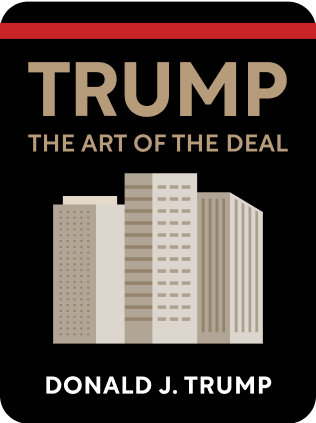

This article is an excerpt from the Shortform book guide to "The Art of the Deal" by Donald J. Trump. Shortform has the world's best summaries and analyses of books you should be reading.
Like this article? Sign up for a free trial here .
How did Donald Trump start his casino business? Where was the first casino Trump opened? What made it a success?
Trump’s casino business started off with buying off the boardwalk site in Atlantic City, New Jersey. He already had the Trump Plaza on his resume and he used it to show his credibility and convince the landowners that he could give them a fair price and finish the project.
Keep reading for the story of Trump’s first casino.
Donald Trump’s Casino Business: How It All Started
Trump realized that no success he could achieve in hotels would compare with the profits a casino could bring in. So he visited Atlantic City.
At the time, New Jersey was preparing to vote on whether to legalize gaming in Atlantic City. Before the initiative had even passed, Atlantic City real estate values shot up.
Trump wasn’t willing to risk buying property in Atlantic City while the prices were hot and legalized gambling wasn’t a sure thing. If the gaming initiative failed, he’d lose his entire investment.
If the initiative did pass, Trump preferred to pay more with that certainty.—and he figured the cost would still be a drop in the bucket compared to his inevitable casino profits.
The referendum ultimately passed, but prices rose so high that Trump decided to continue holding out for a good deal. After about three years, he heard about a Boardwalk property that might be for sale.
By the time Trump considered buying, several factors caused the casino construction rush to cool off:
- Other casino projects had hit major obstacles, including building delays and rejected gaming licenses
- An FBI sting had revealed corruption among Atlantic City politicians and the state Casino Control Commission
- It appeared that gaming in Atlantic City might turn out to be more seasonal than expected, and that there might only be enough business to support a few casinos
In Trump’s view, Atlantic City’s struggles could help him secure a great deal.
Others had already attempted to develop the boardwalk site Trump was eyeing, so he’d have to deal with:
- Multiple parcels with different owners, including investment groups and families who owned homes on the land
- Disputes over purchase options
- Lawsuits about past agreements for multiple landowners to jointly lease or sell the land
Real estate professionals advised him to avoid such a convoluted project, but again, he felt the property’s issues would help him secure a better deal.
With Trump Tower on his resume, he played off his credibility. He assured the owners that he could give them a fair offer and that he’d finish the casino. Trump also leveraged the fact that the owners might not get any other offers because no developer wanted to take on this project. After a long negotiation, Trump secured all the pieces of the Boardwalk site.
Trump’s Bargaining Chip
The fact that casino construction had stalled in Atlantic City worked in Trump’s favor, since state officials would be eager to have a successful casino up and running. However, that was still no guarantee that Trump’s gaming application would be approved, or that he’d get the decision anytime soon (it was a notoriously slow process).
Trump met with New Jersey’s attorney general and pointed out that he’d already invested millions in the Boardwalk site and made it clear that, while Trump was excited by the prospect of building in Atlantic City, he was prepared to walk away. Specifically, Trump told the attorney general he refused to start building until his license was approved, and he wasn’t willing to wait more than six months for the decision.
The attorney general couldn’t guarantee approval, but he assured Trump his gaming application would be processed within six months. True to his word, Trump received a decision nearly six months later—and he’d been approved.
Closing the Deal
Now that Trump was in business, he needed an experienced casino operator.
Michael Rose, the chairman of Holiday Inns, had heard about Trump’s casino project and reached out and proposed they form a partnership. Trump didn’t want to appear desperate, so he told Rose that he didn’t need a casino operator, but that he was willing to hear Rose out.
Rose said he was impressed by Trump’s reputation for finishing projects on time and within budget. He was especially impressed with Trump’s casino project and how fast Trump proceeded from land-buying to construction.
Trump and Rose agreed on a 50/50 partnership, plus Holiday Inns would contribute $50 million toward construction, reimburse Trump’s investment up to that point, and guarantee Trump against any operating losses for five years. But the deal was subject to the board’s approval.
The board decided to hold its next meeting in Atlantic City so that the members could see the site before making their decision. The problem was that construction wasn’t as far along as Rose thought, so Trump told his construction supervisor to get every piece of heavy machinery he could onto the site and in action for the board’s visit, even if they were just digging dirt from one spot and moving it to another.
When the board visited the construction site, it looked like the workers were doing an unbelievable amount of work. The optics impressed the board members so much that they approved the deal.
Trump Hired the Best
After some time, Trump and Holiday Inns disagreed about how to manage the business, so Trump bought out Holiday Inns. He renamed the facility Trump Plaza Hotel and Casino and hired a new general manager.
Everyone Trump asked had recommended Stephen Hyde, the executive vice president and chief operating officer at the Golden Nugget. Hyde had an impressive resume in the casino industry and had the right personality for the job.
Trump poached not only Hyde, but he also poached Hyde’s best former employees. In order to maximize his businesses’ successes, Trump always aims to hire the best.
When looking for managers to run the casino, Trump’s strategy was to:
- Find out your competitors’ top-performing managers
- Offer the managers more money
- Offer them performance-based bonuses and other incentives
The facility brought in about $35 million gross operating profit in 1985 during its first year, under Holiday Inns’ management, and was projected to reach $38 million in 1986. Trump’s management took over in May of 1986 and finished the year with a gross operating profit of $58 million, far exceeding the projection.

———End of Preview———
Like what you just read? Read the rest of the world's best book summary and analysis of Donald J. Trump's "The Art of the Deal" at Shortform .
Here's what you'll find in our full The Art of the Deal summary :
- What Donald Trump says about his early life before the White House
- The 11 principles Trump says guided his business decisions
- How the West Side rail yards project proved to be a challenge for Trump






